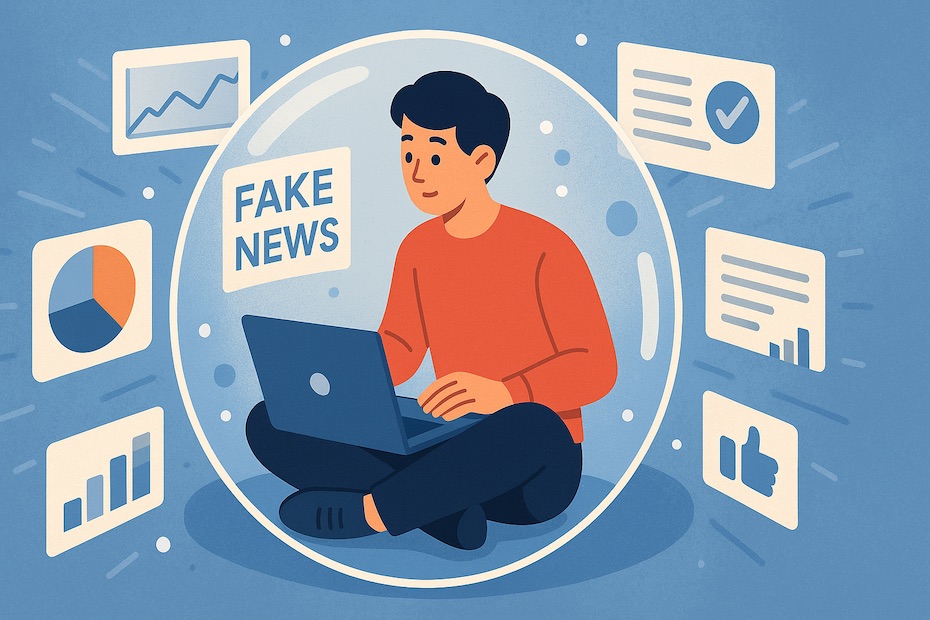So, you think you’re pretty savvy, huh? You’ve dodged those Facebook “cures” for baldness, laughed at flat-Earthers, and maybe even fact-checked a meme once. Bravo. But let’s be real—how confident are you that what you “know” wasn’t spoon-fed to you by an ad-funded algorithm with the subtlety of a toddler on espresso?
Welcome to the mind-numbing arena of “independent research,” where digging for the truth feels less like solving a mystery and more like defusing a bomb in the dark—with oven mitts.
Let’s walk through this noble (and slightly masochistic) journey of yours—stage by glorious stage.
The Awakening (a.k.a. “Wait… Who’s Lying?”)
It usually starts innocently enough. Maybe you see a post claiming oat milk cures insomnia, or that your favorite energy bar funds squirrel surveillance programs. Weird flex, but okay.
Something clicks in your brain—a faint voice whispering, “Maybe I should look into this.” Welcome to the point of no return.
You Google it. Instantly, you’re bombarded by articles titled, “What Big Dairy Doesn’t Want You to Know” and “Wake Up, Sheeple!” from websites with names like HonestFactsUnleashed.biz.
You suddenly realize…you might have to scroll past the first page of Google. Gasp.
The Source Safari
Congratulations, researcher. You’ve entered the wild: a digital jungle filled with predators like cherry-picked studies, sketchy YouTube “experts,” and blog posts citing exactly zero sources.
You click on something that seems trustworthy. It has graphs! It uses words like “peer-reviewed!” Then you realize the site is owned by a vitamin company… selling the exact product it recommends.
You retreat. Wiser. Slightly angrier. Possibly vitamin-deficient.
The Academic Abyss
At this point, you decide to go “legit.” Time to look at actual research papers. You find a promising title and click the link…only to be hit with a $47 paywall.
Of course. Because knowledge, apparently, is a luxury item now.
You hunt for free PDFs like a raccoon rummaging through recycling bins. Eventually, you find one. It’s 37 pages long, written in dense academic language, and includes a sentence like: “Findings were adjusted via longitudinal extrapolation of temporal bias variances.”
Your brain taps out by page three.
The YouTube Black Hole
You give academia a break. Maybe someone explained that research on YouTube?
You find a channel with a guy in a hoodie explaining the “real” science in front of a whiteboard…and 1.2 million subscribers. Five minutes in, he mentions aliens, the Illuminati, and something called “water memory.”
You backpedal faster than someone trying to unsubscribe from a political text list.
Bias Bingo
Now you start really checking sources. Who funded the study? What’s the sample size? Was it double-blind or just double-bogus?
You read footnotes. You check citations. You cross-reference databases. You start feeling like you’re in a conspiracy thriller—except instead of solving crimes, you’re just trying to confirm if eggs are good or bad for you this week.
The Cold, Clean Truth
After hours of sorting trash from treasure, the real information finally surfaces. It’s unbiased, factual, and… kinda boring.
No clickbait. No sweeping conclusions. Just measured statements and “suggests” instead of “proves.” You realize: the truth is usually somewhere in the boring middle—without flashy font or all-caps headlines.
You sigh. You smile. You hit “bookmark.”
The Smug Afterglow (a.k.a. “I’m a Thought Leader Now”)
You now possess a rare power: context. Your friends bring up the topic. You casually drop facts. They stare at you like you’re some kind of wizard. You are. A tired wizard with carpal tunnel and a mountain of citations.
But hey, at least you didn’t fall for that tweet saying avocados cause hallucinations.
Top Reasons You Should Stop Relying on Algorithm-Approved “Facts”
- Algorithms are biased toward profit, not truth
- Sponsored content wears a disguise called “blog”
- Echo chambers make you dumber (factually proven)
- Independent research finds the boring-but-accurate stuff
- Knowing the source beats sharing the meme
Conclusion: The Price of Truth Is Eternal Scrolling
Independent research isn’t easy. It takes patience, endurance, and the willpower to resist TikToks that claim the moon landing was faked in an IKEA.
But once you get through it, you’re not just better informed—you’re practically superhuman. You’ve dodged bias, swerved around corporate agendas, and emerged with actual, useful knowledge.
So next time someone says, “I did my research,” ask if that means Reddit and a crystal ball… or 18 hours of academic footnotes. You’ll know the difference.
Trust, but verify. And never believe a source that uses Comic Sans.
For more independent deep dives, algorithm-slaying insights, and content that doesn’t insult your intelligence, follow along at this blog.

Cassandra Toroian is a sports-tech entrepreneur and CEO/co-founder of Ruley, the AI “e-referee” serving tennis, pickleball, padel, golf, and soccer. With 25+ years building companies—and a background in finance (MBA) plus Python training—she’s also co-founder of Volleybird and author of Don’t Buy the Bull. A former Division I tennis player, she’s focused on using AI to make sport fairer and more accessible.

